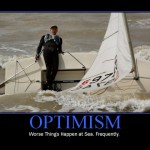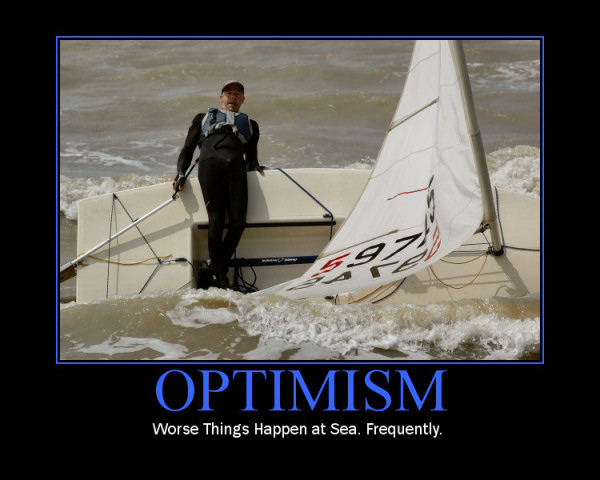07 Feb 2012
Are You A Natural Born Optimist?
First let’s get one thing straight – happiness and optimism are not the same thing. Happiness is an emotion, a feeling, a state of mind that can be changed in an instant. Optimism is something quite different – it is a belief about the future.
Optimists trust that the future will be mostly good – they also believe their decisions, choices and actions shape their destinies. There is evidence to suggest that optimists tend to have better coping mechanisms and tend to be less negatively impacted but life’s little ups and downs. They recover faster, tend to eat right and exercise, are less likely to smoke, suffer less from aches and pains and are at a much lower risk for dementia and other diseases.
But what if you’re not a natural born optimist? Studies seem to indicate that optimism is only slightly influenced by genetics – 20% at best. In fact your experiences, the language you use to describe them and the meanings that you have attributed to them shape your world and your future outlook. Every single one of us can learn to become optimistic. However optimism is not achieved by making a decision one day to be optimistic – it takes more than attempting to change your feelings or outlook consciously.
Particularly in this time of economic uncertainty, faith and optimism are powerful belief structures. Arguably however, both are habits and need to be developed and nurtured over time. In fact 99% of what we do is pure habit – the domain of the subconscious.
Positive thinking alone is inherently undependable. Sustained optimism requires more than The Secret, The Law of Attraction and a few positive affirmations. Optimism is not something you are born with – it is a learned behaviour/habit. The same is true of pessimism. When the going gets tough, affirmations fly out the door and the subconscious habits will kick back in and cause all of us to sabotage our own success. In actual fact, each of us is our own worst enemy.
At the end of the day, it is not what happens to you that matters. It is about who you are and what you become because of, not despite, what happens. Change your perspective today…change your life forever!
Article Source: http://EzineArticles.com/2919330
08 Dec 2011
Is Your Optimism Holding You Back?
 “The pessimist complains about the wind; the optimist expects it to change; the realist adjusts the sails.” William Arthur Ward
“The pessimist complains about the wind; the optimist expects it to change; the realist adjusts the sails.” William Arthur Ward
I was reminded of this brilliant principle last week when I spoke to one of my business coaching clients. There can be no doubt that we are living in interesting times…. the global financial crisis has impacted overall spending and consumer sentiment – and this has hurt many small businesses around the country. It’s no good hoping that circumstances will change – in order to survive we all need to dig deep and find creative ways to work smarter not harder.
Jim Collins, in his book, “Good to Great,” talks about this very interesting paradox that he calls “The Stockdale Principle”. According to Collins, “you have to be realistic about your current situation and yet, stay optimistic about the future”.
General Stockdale was the highest ranking American prisoner of war in Hanoi, Vietnam. Over the years he began to notice an interesting phenomenon – optimism could in fact be a liability. His fellow prisoners (who were the eternal optimists) constantly set themselves up for disappointment. They set huge milestones – “we will be rescued by Christmas” – but those milestones came and went year after year and with it… their will to live.
Conversely, the prisoners who looked at the painful day-to-day reality they were in and channeled their energies to the right places survived. This is not to say that the second group were pessimists but rather realists that maintained an unwavering faith in the end game, and a commitment to survive despite the brutal fact of their incarceration and torture over a period of years.
Here’s how Stockdale put it in his own words: “I never lost faith in the end of the story. I never doubted not only that I would get out, but also that I would prevail in the end and turn the experience into the defining event of my life, which, in retrospect, I would not trade.”
How many of us would look back on seven years of detention – with regular torture, dismal living conditions and an uncertain future – as an experience we would not trade? Do you regard the greatest obstacles or challenges in your life as the defining moment that shaped who you are today or do you choose to look at them as an excuse or reason why you have not achieved more?
Have you ever sat back and thought how this distinction between optimism versus reality could apply to your business/career or your life in general? Where in your life are you ignoring reality in favour of being optimistic and missing a crucial opportunity to take action?
Take for example my business coaching client that I mentioned above. She has an employee who doesn’t take responsibility for her actions, doesn’t pay attention to details and is often defensive and reluctant to take direction and feedback. This employee is negatively impacting the entire work environment as everyone gets caught up in the drama of it all. My client doesn’t want to let the employee go and is resisting doing what she knows that she must. She hopes that it will somehow improve without any action on her part – she is now learning the distinction between reality and optimism. When she sees the difference for what it is, then and only then, will she become decisive and take action.
Another area where it’s easy to be blinded by optimism is in the financial arena. Do you have detailed financial reports, KPIs and cashflow forecasts in place to drive your decision making or are you simply relying on your optimism instead of reality? Failure to effectively plan in this area (especially in these tough times) could lead to a cash crunch and the demise of your business.
Take a moment today to examine your relationship to optimism, pessimism and realism. Success belongs to those who operate from both sides of the Stockdale Paradox. The key is balance – knowing when to accept reality and take appropriate action AND never losing faith in the end of the story. If you can walk this delicate line of balance and responsibility, you increase your odds of making good decisions and this will lead to your inevitable success and breakthrough results.
In life, we will all experience setbacks, disappointments, loss and challenges. What separates successful people from the rest is how you deal with those inevitable struggles. This is a very important distinction and it is what divides the winners from the losers. You must never confuse faith that you will prevail in the end – which is something that you can never afford to lose sight of – with the discipline to confront the brutal facts and reality of your current situation, whatever that might be.
Article Source: http://EzineArticles.com/2884021
“I’m your biggest fan, I’ll follow you until you love me
Papa, paparazzi
Baby, there’s no other superstar, you know that I’ll be
Your papa, paparazzi”
In today’s challenging business environment, customers demand more from the products and services they buy—they want what they want, when and how they want it. And if they do not get it from you, they can and will obtain it from one of your competitors. Therefore, creating raving fans—customers who love what you do and are willing to follow, listen and respond to your call(s) to action —can give you a significant strategic advantage and improve your bottom line.
Now some of you may be wondering “what does Lady GaGa have to do with best business and branding tactics?” She’s never attended business school nor does she have a history of entrepreneurship. While it is easy to question her outlandish costumes, her repetitive child-like lyrics, and her over-the-top media stunts, it is hard to ignore her obvious musical talent and her ability to be at the right place at the right time with the right tune. Whether you love or hate her (and 99% of you are definitely in one camp or another), it is difficult to ignore the tremendous achievements of this branding genius.
Less than 18 months ago, she was virtually unknown – and today she has two platinum selling albums and is the envy of artists that have been in the business for decades.
How did she do it?
Read More
30 Mar 2010
Are You Trying To Make the EASY Way Look Hard?

Rhondalynn Korolak, Author of "Financial Foreplay®" and "On The Shoulders of Giants
What if I told you that YOU are you’re own worst enemy? Would you be offended or would you smile and agree, because you know it’s true. It’s true for ALL of us.
You can tell a lot about a business person by the way they spend their time. We all spend our time in various ways. Many business owners and senior executives tell me that there is not enough time in the day to get everything done. Personally, I have a belief that there is always enough time in the day to do all of the things that are WORTH doing. The key is to identify what is worth your while.
Sometimes activity can be a kind of anesthesia for the pain of not achieving the results you want and deserve. Action is always better than procrastination. However, more activity is not always better than less.
Read More
14 Mar 2010
When Is “I Don’t Know” The Right Answer?

Rhondalynn Korolak, Author of "Financial Foreplay®" and "On The Shoulders of Giants
Lily Allen may not be an authority on business, but she hit the nail on the head with her honest, irreverent spin on a timeless mystery – “how to know what to do when you have no idea and you’re not prepared”. In her platinum selling song, she sings:
I don’t know what’s right and what’s real anymore
And I don’t know how I’m meant to feel anymore
When do you think it will all become clear?
Everyone knows that we have been conditioned NOT to admit that we don’t know all of the right answers. Even though we know it’s not true, our teachers, bosses, politicians and even the media have modelled this “fake it until you make it” mentality. Since the mind doesn’t know the difference between a real or imagined event, acting ‘as if’ seems like the logical solution to temporary uncertainty, or does it?
“I don’t know” is a simple phrase. Simple and powerful at the same time. While there can be no doubt that to use it denotes uncertainty and the risk of embarrassment, with it comes an attribute that is far more rare and influential…authenticity!
Over the course of my life, I have been asked some difficult questions both personally and professionally – I’ve been put on the spot, caught unprepared and left exposed and vulnerable. Many times, I racked my brain to come up with the answer – a plausible response that hit the nail on the head or got me out of jail [metaphorically speaking] for free! Other times, I just got lucky.
But occasionally I must admit, “I just don’t know!” I simply cannot say for sure. I just don’t have the answer right now.
Sometimes admitting you don’t know can be the most empowering, intelligent, authentic and liberating response that you can offer. Compared to stumbling through a half baked idea, outright lying or trying to pull a cohesive response out of thin air, admitting you don’t know is a sane solution to this diabolical dilemma.
To be honest, none of us has “The Answer” to everything. If you think you do, chances are you know even less than you thought! If someone has taken the time to ask a question and placed their trust in your expertise, they deserve pearls of wisdom not propaganda.
In fact, in order to be a true leader and to earn authority, which is the foundation of your ability to influence others, it is simply not enough to be knowledgeable. You also need to be truthful. Therefore, in order to master the power of influence, you must establish yourself as both honest and powerful in your communications.
When in doubt, “I don’t know but I will find out” is the best answer.
Article Source: http://EzineArticles.com/3925288










